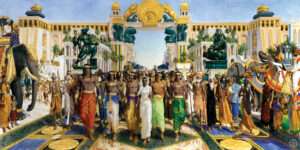The news that Pandu’s sons were alive and that the Brahmana who had conquered Draupadi was no other than Arjuna spread quickly.
There were moments of genuine panic in Hastinapura. Duryodhana, terrified, immediately began to make plans to annihilate them, but this time Vidura, Bhishma, and Drona not only exposed him publicly along with his friends, but also managed to bring strong arguments to persuade Dhritarastra to make peace with those who, after all, were the sons of his younger brother, whom he had loved so much.
However, Duryodhana was very clear in specifying that there could never be a relationship of brotherhood or friendship between them. So, the problem was to please both. It wasn’t easy.
Dhritarastra then called a general council to try to find a solution to the crisis that could become very serious. All the most important and respected personalities of the Kurava court participated in it and expressed their views.
Duryodhana kicked off the symposium by arguing:
“The Pandavas are our enemies, they always have been. And now that they have found allies like the Vrishni and the Panchala, they will unleash against us and attempt to destroy us. We must understand that they are a continuing threat, so we must use all the weapons at our disposal in order to make them weaker. I propose to corrupt their allies and try to sow dissension among the Pandavas themselves; this is the only way we will have them under control.”
Karna replied:
“I agree with Duryodhana when he says that the Pandavas are our sworn enemies and that they must be fought; however, I do not agree with the methods he suggests. A truly valiant warrior does not need any corruption or sowing dissension among his enemies, besides the fact that we are stronger militarily. Therefore, let us behave bravely; let’s get down to the battlefield and destroy them. Only in this way our name will not be tainted by infamy in the centuries to come.”
Bhishma, Vidura and Drona said:
“You are wrong when you claim that Pandu’s children are our enemies; they are part of our family. It is true that they know that more than once you have attempted their lives, but it is also true that they are very virtuous; and if we begin to act according to justice, in order not to shed brotherly blood, they are willing to forget the wrongs they have suffered. We must make peace and give back what is rightfully theirs.”
Asvatthama said:
“The Pandavas are among my closest friends, and therefore I do not share the warlike intentions of Duryodhana and Karna. Let us not forget loyalty and justice, the values on which our lives rest. Do not descend to the lowest level; let us remember the principles of truth.”
And just like Bhishma, Drona, Vidura and Asvatthama, all the righteous and virtuous monarchs and sages spoke out against the vile purposes of the evil prince. And Duryodhana understood that he was supported only by Karna, by Sakuni and by his brothers; in reality even the latter did not really agree, they agreed with him only because they were fond of him. Duryodhana was isolated.
“It doesn’t matter what is decided here,” he said in a low voice to Karna. “In case of war everyone will be forced to fight for me, even if they don’t like it.”
Finally Dhritarastra agreed:
“Having listened to all of you, I believe that making peace with the Pandavas is the best and the most just of solutions. Vidura himself will go to Panchala to speak to our nephews and to invite them here, to Hastinapura, to have a clarifying conversation.”
Duryodhana did not reply; he realized that at that moment it would be better for him to hide his warlike intentions. Even if he was forced into a truce, he thought, in peacetime he might find better ways to destroy them safely.
Vidura left the same day and was received by all with great affection and respect. As soon as he arrived he found the Vrishni and Panchala armies in a state of alarm, ready to start a war in a matter of days. Krishna was there too, with all his family members.
“I have a message from your uncle Dhritarastra,” the sage Vidura said after the greetings. He says:
“I am glad that you are still alive, but I have heard that you harbor desires for revenge, so much so that you even want to fight against us. I am amazed: how can righteous men like you come to such purposes? Come to Hastinapura and let us try to solve the problems that have arisen between you and my son Duryodhana”.
That message irritated the Pandavas. Now the uncle spoke of peace, but he had never done anything to prevent his son from attempting on their lives, or to contain his hatred. And now that they had managed to get strong allies he spoke of peace, hoping for a peaceful solution. Nevertheless, Yudhisthira did not want any unnecessary bloodshed, so, he decided to accept the invitation.
A few days later, the Pandavas left for Hastinapura.
In the ancient capital city of the Kuru they were received with full honors and with great affection. Above all, the Pandavas appreciated the expressions of sympathy from the citizens who still loved them unconditionally and had never accepted Duryodhana’s feelings and cowardly strategies
This is a section of the book “Maha-bharata, Vol. 1”.
To buy the complete book, click above
Post view 706 times




Leave a Reply